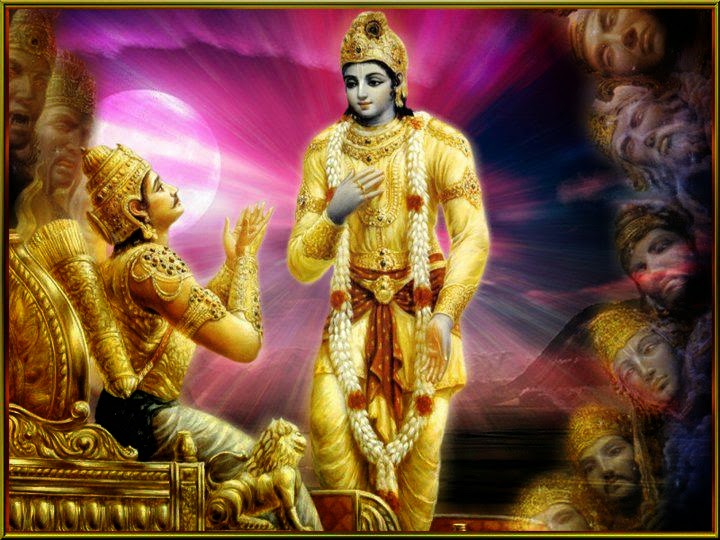Gita : Ch-4. Slo-30.
Srimad Bhagavad-Gita :
Chapter-4. ( Jnana-karma-sanyasa-yogam )
Slokam-30. ( Some of them, curtailing the eating process, offer the outgoing breath into itself, as a sacrifice. All these performers who know the meaning of sacrifice become cleansed of sinful reaction. )
Apare niyataharah pranan praneshu juhvati,
sarvepyete yajnavido yajnakshapitakalmashah.
apare niyataharah = some others controlling intake of food;
pranan praneshu juhvati = offer the outgoing (exhaling) breath into itself, as a sacrifice;
yete sarve api = all these people;
yajna-vidah = having known the yajna tattvam;
yajna-kshapita-kalmashah = being cleansed of the result of such performances ( sacrifices ) sinful reactions.
Now Lord Krishna is confirming the result accruing to the 12 previously mentioned yagnas or offering of worship to propitiate the Supreme Lord who have accomplished this and that they have purified themselves having absolved all their sins by yagna.
Commencing with artha-yagnas or offering of donations for worship and propitiation of the Supreme Lord up to the yagna of pranayama or breath control, different varieties of karma yoga or prescribed Vedic activities are given that are engaged in by persons according to qualification. Clearly comprehending the purport of chapter-3, slokam-10 that all beings are blessed and benefited by yagna; these practitioners have dedicated their lives to the performance of yagna and yet they do not neglect the regular daily duties as well as the occasional duties as prescribed in the Vedic injunctions.
Thus they have acted for their ultimate welfare and destroyed all of their sinful reactions from past actions. Maintaining their existence by partaking exclusively only of the sanctified food offered in yagna these practitioners of karma yoga eventually realise the atma or soul within their etheric heart and perceive the eternal Brahman or the spiritual substratum pervading all existence which leads to the Supreme Lord.
Yogis or those following the science of the individual consciousness attaining communion with the ultimate consciousness enjoy the ambrosial nectar of the remnants left over in the time period after the yagna or offerings of worship are completed. The compound word sista-amrta refers to the remains of nectar after yagna. Through purity of mind followed by acquisition of knowledge one realises the eternal Brahman or the spiritual substratum pervading all existence. This is the explanation given by those that do not follow Vaisnavism or the knowledge that the Supreme Lord Krishna and His authorised incarnations are the ultimate goal of the Vedic scriptures.
According to the Vedic doctrine of Vaisnavism when the yogis perform the previously mentioned yagnas without desire all their sins are absolved first and then they enjoy the remnants of offerings to the Supreme Lord because yagna itself is verily the Supreme Lord as well. They eat the transcendental food which is known as amrta or nectar because it has been spiritualised by the performance of yagna to the Supreme Lord and realise the Brahman. The Supreme Lord Krishna's expansion Narayana revealed in the Skanda Purana that those devoted to Him should only partake of food that was already offered to Him. Such food has the power to purify one of all sins and leads to moksa or liberation form the material existence.
One who partakes every meal, each day of the food offered to the Supreme Lord as duly offered by the Vaisnavas and Brahmins according to the Vedic scriptures receives inexhaustible merit. Each morsel of such sanctified food is worth 100 such vows as that practised from the new moon to the full moon given previous in slokam- 28. The Skanda Purana also gives the harsh demerits of one who does not eat sanctified food that was first offered to the Supreme Lord.
The Skanda Purana reveals that there are two types of food suitable for eating. One is food that was duly offered to the Supreme Lord and the second is the remnants of the food partaken after the devotees of the Supreme Lord have eaten from His offerings. The third type of food is the food that was not offered to the Supreme Lord before partaking and that should never be eaten by one desiring there own best welfare.
One who eats and drinks food and beverages that were not first offered to the Supreme Lord verily the food is equal to excreta and the drink is equal to urine. Therefore the conclusion is for one to ponder and that is: How can there ever be nectar and the realisation of the Brahman and the attainment of moksa for those who eat food not first offered to the Supreme Lord Krishna.
To be continued ...





Comments
Post a Comment